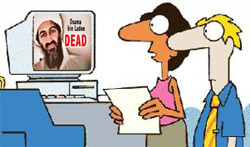Scammers Poison the Web with Osama bin Laden Poisoned Search Results and Spam
May 07, 2011 (PRLEAP.COM) Technology News
The security software provider Enigma Software Group USA LLC weighed on the reports of online scams related to Osama bin Laden's death in a blog post on blogs.forbes.com.By following some easy steps, you can avoid being taken to the bank by Web scam artists who are using one of the biggest news events in recent memory – the death of Osama bin Laden – to steal credit card, bank account and Social Security numbers.
Bin Laden fended off capture for nearly 10 years. Cyber cyber criminals began trying to capture confidential records from computers within minutes of his announced demise.
In one of the fastest exploitations of information ever, tricksters started manipulating the intense interest in the raid on the terrorist's compound right after President Barack Obama's news conference on the incident by inserting spyware and other malware into links and graphics designed to draw immediate and widespread attention.
Whether you're being asked to open links on Facebook or other social sites promising video of the capture of Bin Laden or images of his purported body elsewhere on the Internet, to keep your computer system safe, avoid the temptation to open anything from an unknown source.
"Osama Bin Laden Death" was the highest rated search phrase on May 2, the day after the killing, according to Google Trends.
Since then, many people have been seeking images of his body, while at the same time sifting the Internet to get details. The massive surge in search volume this week has given cyber crooks a chance to capitalize on their curiosity.
Don't be fooled by one of the most popular images in circulation: a fake photo or a pair of shots that supposedly show Bin Laden's gruesome, bloodied face. It begins: "Osama Dead – Censored Video Leaked. Osama Dead – Censored Video Leaked. Osama is dead, watch this exclusive CNN video …" After clicking on the video, you are asked to download Adobe Flash Player.
Once downloaded, it secretly installs a malicious adware tool known in security circles as Hotbar. In 2006, its developer, Zango, settled a Federal Trade Commission complaint charging it with "deceptive failure to disclose adware" by signing a consent decree without admitting guilt.
Not only have the cyber sharks infested the wider Internet waters, but they're also prowling particular seas, like Facebook and other social networks, for prey. A bogus Bin Laden photo is being widely circulated on Facebook by "friends" who don't realize it's a combination of two images: one of a corpse and a 1998 shot of Bin Laden, according to the Guardian newspaper in Britain.
And a spam scam entitled "Sweet! FREE Subway To Celebrate Osamas Death – 56 Left HURRY!" is making the rounds on Facebook. It also promises "2 Southwest Plane Tickets for Free – 56 Left Hurry." But when you click on the faux link, you're asked to post a message to get more details on the offer, which sends them to a site designed to steal, or "phish," for your personal information.
Clicking on bogus links from spam e-mail campaigns or search engine optimized Web pages with news about Osama Bin Laden's death may redirect Internet users to malware-laced web pages that try to install Best Antivirus 2011, a rogue anti-virus program.
Here are three ways to keep the bad guys at bay and your systems safe:
